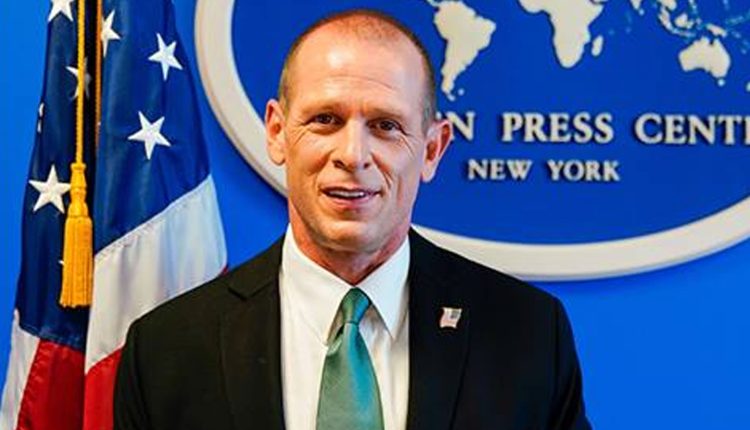U.S. State Department: No Need for Direct Trump-Al-Sharaa Meeting Amid Sanctions Speculation
By Kardo Roj
RIYADH, Saudi Arabia (North Press) – Amid growing speculation over a potential meeting between U.S. President Donald Trump and Syria’s transitional leader Ahmad al-Sharaa, a spokesperson for the U.S. State Department said Tuesday that “a face-to-face meeting is not necessary,” signaling a cautious but deliberate approach from Washington.
In a televised interview with Al Arabiya, regional U.S. State Department spokesperson Samuel Werberg addressed the rumored meeting between the two leaders, expected to potentially occur during Trump’s ongoing visit to Saudi Arabia. “So far, we have no details about any meeting between Trump and the Syrian president,” Werberg stated.
His comments come just one day after The Times reported that al-Sharaa may propose initiating talks with Trump on joining regional peace agreements with Israel—a move that could reshape Syria’s foreign policy orientation and alter long-standing diplomatic alignments.
Werberg clarified that the U.S. has already communicated its expectations to Syria’s transitional authorities, implying that diplomatic engagement, if it progresses, must be tied to concrete policy shifts. “America has made its demands clear to the new authority, and the new authority knows what it must do,” he said.
Although Werberg stopped short of elaborating on specific conditions, previous U.S. statements have consistently emphasized the need for human rights reforms, accountability, and a political resolution to the Syrian conflict aligned with UN Security Council Resolution 2254.
His remarks also touched on Trump’s unorthodox diplomatic style. “From Trump’s track record, we know that when he says something publicly, he usually follows through,” Warburg noted, referencing the president’s past foreign policy actions—including the 2020 Abraham Accords, which normalized relations between Israel and several Arab states.
Sanctions Relief Under Consideration
The backdrop to these developments is Trump’s own recent statement that he is considering easing sanctions on Syria, a comment that has sparked both domestic and international debate. Speaking Monday, Trump revealed that Turkish President Recep Tayyip Erdoğan had personally urged him to lift sanctions imposed on Damascus.
The nature of these potential changes—whether partial or comprehensive—remains unclear, but Werberg highlighted the lingering question: “When and how will he lift the sanctions, and will it be entirely or partially?”
Any sanctions relief would carry far-reaching consequences, not only for Damascus but also for the balance of power in Syria’s fragmented landscape. The U.S. Caesar Act, passed in 2019, currently imposes strict penalties on entities conducting business with the Assad government, targeting sectors like construction, energy, and finance.
Implications for Northeast Syria
For the Autonomous Administration of North and East Syria (AANES), the potential shift in U.S.-Syria dynamics is a development to watch closely. Operating outside Damascus’s control, the AANES has long sought international recognition and a seat at the table in any political settlement.
The Syrian Democratic Forces (SDF), the military partner of the AANES and a key U.S. ally in the fight against ISIS, have repeatedly emphasized the need for inclusive dialogue that reflects the diverse composition of Syria’s population. Should U.S.-Syria engagement progress, northeast Syria’s leadership will likely seek assurances that its governance model and security architecture remain protected.
Analysts caution that rapid rapprochement with Damascus could marginalize areas currently governed by the AANES, particularly if the process sidesteps broader political reform or reconciliation mechanisms.

